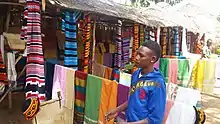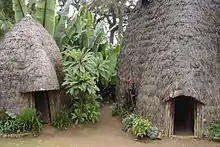.jpg.webp) | |
| Total population | |
|---|---|
| 29,000 (1994 est.) | |
| Regions with significant populations | |
| Ethiopia | |
| Languages | |
| Dorze | |
| Religion | |
| Christianity | |
| Related ethnic groups | |
| Gamo, Dizi, Yem |
The Dorze are one of the Gamo communities inhabiting the Gamo Highlands in southern Ethiopia. They speak the Dorze language, an Omotic tongue.
Population
According to Ethnologue, the Dorze numbered 29,000 individuals (1994 census), of whom 9,910 were monolingual.[1]
They primarily live in the southern parts of the country, though some have migrated to Addis Ababa and other regions. Many reside in villages near the cities of Chencha and Arba Minch.
Language
They speak the Dorze language, an Omotic tongue.
Culture


Weaving is a primary profession for a number of Dorze. Traditional Dorze textiles are colourful.[2][3]
They are known for their traditional weaving of huts made out of local bamboo.[4] The huts can last up to 80 years.[5]
Their polyphonic multi-part vocal music features a sophisticated use of hocket.
Religion
Dorze people originally adhered to traditional African religions. Most are members to the faith of the Ethiopian Orthodox Tewahedo Church.[5][6]
History
Communities of Dorze people live on the peripheries of Addis Ababa, mostly in the Burayu and Sebeta areas. A group of Dorze people had a conflict with some Oromo people. This issue got an immediate attention among the Qeerroo who are active in Ethiopian politics in recent years. The incident occurred as the Qeerroo were organizing themselves for the reception of the Oromo Liberation Front leaders, on the 14 and 15 September—following political reform by prime minister Abiy Ahmed. This little conflict between the Dorze and Oromo people grew to a full-blown attack on the whole population of Dorze as the Qeerroo returned from the reception. The result was a universal massacring: killing the men and children with machetes, a ruthless raping of the women in front of their husbands and children, targeting specifically Dorze (and some Gurage) people living around Addis Ababa, on the 16 and 17 September 2018. Independent media sources called the killing a case of ethnic cleansing.[7] In the Burayu area alone, the media has reported that 23 people have been killed, more than 500 have been injured and over 15000 people have been displaced.[8][9][10] Other sources citing data from the police have confirmed that more 60 people have been killed[7]
References
- ↑ "Dorze".
- ↑ Dorze Weaving in Ethiopia Uppsala University
- ↑ Mathiszig, Lucie (2014). "The Dorze Weavers of Ethiopia". Textile. 12 (2): 180–187. doi:10.2752/175303714x14023922798101. S2CID 129064678.
- ↑ DORZE house FAO
- 1 2 "Dorze people". 7 October 2019.
- ↑ "Dorze in Ethiopia". joshuaproject.net. Retrieved 11 December 2022.
- 1 2 "Oromo Ethno-nationalists massacred at least 60 Ethiopians near A. Ababa". www.borkena.com. 17 September 2018. Retrieved 20 September 2018.
- ↑ "ከቡራዩ ተፈናቀሉት ከነበሩት 11 ሺህ 902 የሚሆኑት ወደ መኖሪያ ቀያቸው መመለሳቸው ተገለፀ - EthioExplorer.com". ethioexplorer.com. Archived from the original on 25 September 2018.
- ↑ "23 killed in Ethiopia's ethnic violence – Police". Daily Trust. 17 September 2018.
- ↑ "Deadly Ethnic-Based Attacks Erupt Near Ethiopia's Capital - The New York Times". www.nytimes.com. Archived from the original on 16 September 2018.
External links
![]() Media related to Dorze people at Wikimedia Commons
Media related to Dorze people at Wikimedia Commons